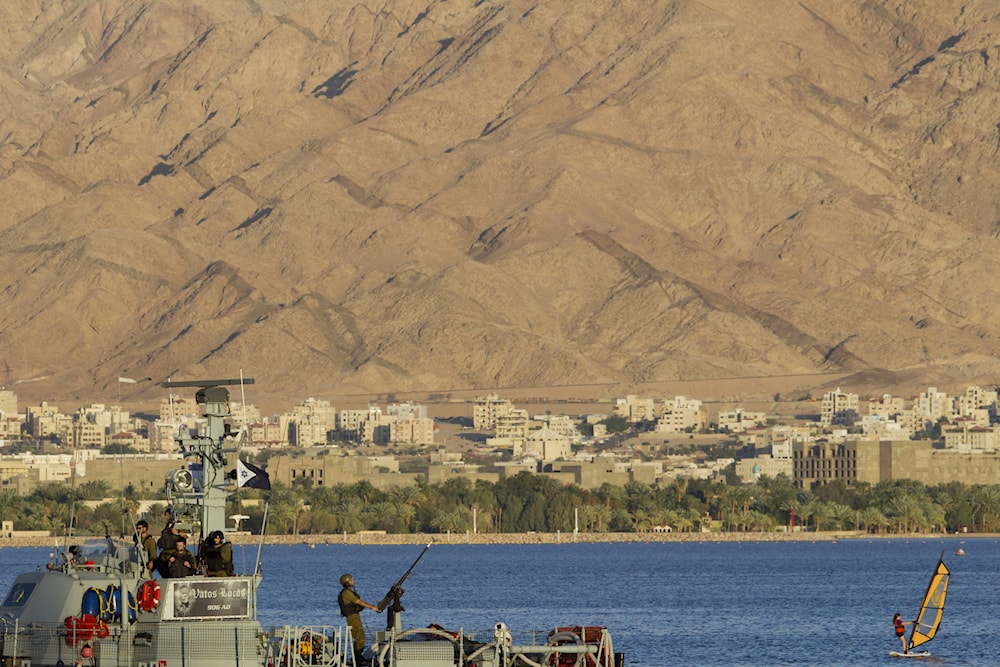'Eilat' port CEO labels it non-functional due to Yemeni strikes
Gideon Golber, the CEO of the port of "Eilat", sheds light on the effects of the Yemeni Armed Forces operations in the Red Sea.
-

An Israeli naval ship during Israeli Prime Minister Benjamin Netanyahu's speech, unseen, at a port in the Red Sea in 'Eilat' settlement, southern occupied Palestine, Monday, March 10, 2014. (AP)
Israeli Channel 14 hosted the CEO of the Port of "Eilat", Gideon Golber, to describe the current situation of the port and how the Yemeni Armed Force's(YAF) operations in the Red Sea against Israeli vessels or ships heading to the occupied ports of Palestine have been affecting its activity.
During the interview, Golber shed light on the important role this port holds for the occupation labeling it as the only southern seaport for the Israeli occupation of the Far East and Australia without having to pass through the Suez Canal. He added that this holds high importance as most of the ports are located on the European side and in the United States and all activities from 'Eilat' are with the Far East.
Golber said that ever since the YAF began its operations in the Red Sea and closed the Bab el-Mandeb Strait, all activities on the "Eilat" port have been halted and ever since that happened all settlers operating on it or using it have been out of a job.
He added that this port is responsible for around 50 to 55% of imported vehicles from the Far East, adding that the occupation exports around 1.8 to 2 million tons of potassium and phosphate from the Dead Sea. It also imports claves and sheep from Australia and they have some other secondary activities, Golber said.
Lack of possible alternatives and unemployment
As Golber was asked about any possible alternative routes that could be taken for the importing of goods from the Far East, he said that some of the goods were arriving at the occupation's "Eilat" port; however, most were not.
An example he provided was calves and sheep which are really difficult to transport through the Cape of Good Hope, hence, the number of imported cows from Australia has decreased.
Golden highlighted that this poses a great problem for the occupation so he is obligated to stress it as "Israel" should do something.
He added that it is unbelievable that "Israel" in the past fought a war over the Strait of Tiran or the Suez Canal and today it allows Americans, the British, and the French to do this job for them.
In his concluding statement, the CEO of the "Eilat" port stressed that he will have to dismiss, at least in the first stage, 50% of the total employees in the port.
Live from 'Eilat' port, Dimitri Lascaris details impact of Yemeni ops
Dimitri Lascaris, a Canadian lawyer and journalist, visited the Israeli occupation's port settlement of "Eilat" on March 17 through 18 and reported that the Yemeni operations conducted by the Yemeni Armed Forces have indeed left the port settlement devoid of any cargo ships.
"There are no cargo ships here, no tankers [visible]," said Lascaris.
According to Lascaris, "All indications" point to the fact that "the attacks on Red Sea shipping by the Ansar Allah movement continued to have dramatic impacts on this particular port facility."
The Canadian lawyer further underscored that the settlement is "far away from the major population centers of Israel," adding that "it's also not served by rail, at least not yet."
My latest:
— Dimitri Lascaris (@dimitrilascaris) March 19, 2024
I just visited Israel’s Red Sea port to see how attacks on commercial shipping by Yemen’s Ansar Allah (supporters of God) had affected maritime traffic to and from Eilat, Israel.
Based on what I saw, Ansar Allah has had a devastating impact.https://t.co/937Me8KiV0…
This means that the Red Sea blockade against the Israeli occupation and in defense of the Gaza Strip has actually choked the settlement, which had no way around due to the lack of rail routes.
Through "Eilat", "Israel" imports vehicles from Asia and delivers and temporarily stores oil cargo.
"There is almost no one on those beaches," Lascaris reported, adding that there is "no indication of any tourism here." Even kiosks and shops appear to be shut down, at this time of year, on a Sunday[March 17].
This is especially significant given that "Eilat" has been dubbed by Israeli media as a touristic destination.
"It certainly does seem quiet here."

 4 Min Read
4 Min Read








